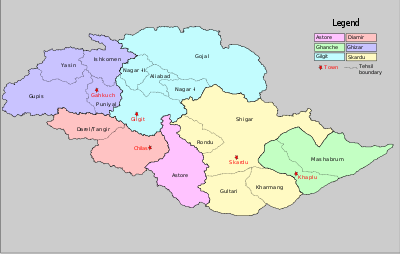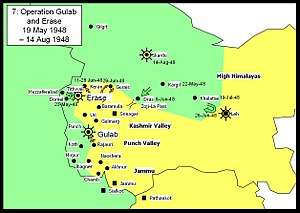Mirza Hassan Khan
Mirza Hassan Khan (Urdu: مرزا حسن خان) was a Captain of the 6th Infantry of the Jammu and Kashmir State Forces. Placed at Bunji in the Gilgit wazarat (now Astore district, Gilgit-Baltistan), Khan rebelled against the Maharaja's regime after his accession to India and participated in the overthrow of the Governor of Gilgit in November 1947. He later fought in the First Kashmir War as part of Gilgit rebel forces under the command of Colonel Aslam Khan and rose to become a Colonel in the Pakistan Army. After leaving the Army, he founded the Gilgit League to protest against the Pakistan's ad hoc administration of Gilgit-Baltistan.
Mirza Hassan Khan | |
|---|---|
مرزا حسن خان | |
 | |
| Born | 27 January 1919[1] State of Nagar |
| Died | 19 November 1983 (aged 64) Gilgit, Northern Areas (now Gilgit-Baltistan) |
| Resting place | Chinar Bagh, Gilgit |
| Alma mater | Sri Pratap College Indian Military Academy |
| Organisation | 4th J & K Infantry, 6th J & K Infantry, Gilgit Scouts, 7 Azad Kashmir Regiment, 4/15 Punjab Regiment & 2/15 Punjab Regiment |
Early life
Mirza Hassan Khan was born in Gilgit in 1919. His father Mirza Taj Mohammad Khan belonged to a Rono family of Gilgit. His mother was from Nagar.[2]
Hassan Khan had early education in Gilgit and then went to Srinagar. However, his father died at this time and he was taken to Poonch by Wazir Mir Husain Shah. He studied in J.V. High School there and stood first among all students in the district. Afterwards, he entered the Sri Pratap College in Srinagar.[2]
While studying in College, he decided to become a soldier and went to Jammu to enrol as a sepoy. But upon the advice of Col. Mirza Faqirullah, he applied for the King's Commission in the army. After studying at the Indian Military Academy at Dehradun in 1937–38, he joined the Jammu and Kashmir State Forces.[3]
The Gilgit Coup

In October 1947, Khan was sent with troops to assist the Dogra governor Ghansara Singh in Gilgit, who was apprehensive of the loyalties of the Gilgit Scouts based in Gilgit. Mirza Hassan Khan sided with Major William Brown of the Gilgit Scouts in overthrowing the governor.[4]
On 2 November 1947, Mirza Hassan Khan and other officers of the rebel forces, announced a provisional government, with Raja Shah Rais Khan as the President and Mirza Hassan Khan as the Commander-in-Chief. William Brown was told that, being a non-Muslim, he could not hold any post in the government. In his autobiography, Khan ascribed to himself a central role in the coup. Scholar Yaqoob Khan Bangash doubts his account.[5]
Soon after the coup, William Brown telegraphed the Pakistan government in the North-West Frontier Province informing them of the developments and asking them to take over the administration of Gilgit. Pakistan's Political Agent, Khan Mohammad Alam Khan, arrived on 16 November and dismissed the provisional government. Thus the Gilgit Agency was absorbed into Pakistan. Mirza Hassan Khan was appointed the military governor for the Bunji sector and asked to focus on that area only.[6]
First Kashmir War

On 19 January 1948, Pakistan appointed Major Mohammad Aslam Khan replacing Major William Brown as the commander of Gilgit Scouts.[7] Major Aslam organised all the forces in Gilgit into three wings of 400 men each, which were called the Ibex Force, Tiger Force and Eskimo Force. The three forces were ordered to advance along three directions into the state of Jammu Kashmir. Mirza Hassan Khan was put in charge of the Tiger Force, which advanced on the Gilgit-Bunji-Kamri-Gurais-Bandipora axis. The force reached Bandipora on 28 April, but had to withdraw to Tragbal. When Gurais was recaptured in June by the Indian forces, the Tiger Force withdrew to Minimarg.[8][9]
Political activism
In 1957, Mirza Hassan Khan founded the Gilgit League, which is said to be the first political organisation formed to protest the Pakistan's ad hoc administration of Gilgit-Baltistan. The party demanded political freedom and democratic rights, and an end to the Frontier Crimes Regulations. The party was banned by Ayub Khan's martial law administration.[10]
Subsequently, Khan joined the Pakistan People's Party. He was arrested by the Zulfiqar Ali Bhutto government in 1973 due to political differences and put in prison.[11]
Military Service
- Took commission from Indian Military Academy Dehradun as Second Lieutenant in 2nd Jammu & Kashmir Infantry of Maharaja's Army in 1938.
- Promoted to the rank of Captain and posted to 4th J & K Infantry on 21 Dec 1941
- Promoted as Major/Company commander in the 4th J & K Infantry on 3 Nov 1943
- Promoted Lt Col in 4/15 Punjab Regiment of the Pakistan Army. Ante Date seniority under decision.
- Lt Col Azad Forces, commanding officer 7 AK Regiment, 1949.
- Arrested in Rawalpindi Conspiracy Case from 2/15 Punjab Regiment, tried by special tribunal and dismissed from service with effect from 5 Jan 1953.[12]
Honours and awards
According to a report on Radio Pakistan, Khan was awarded a Military Cross for bravery by the British Indian Army in 1944, when he fought in Burma as part of the Jammu and Kashmir troops in the Second World War.[13] He was awarded the title of Fakhr-e-Kashmir by the Azad Kashmir government and Tamgha-i-Jurat by the Pakistani government.[1] He was also given the title of Fateh-e-Gilgit wa Baltistan locally (Liberator of Gilgit-Baltistan).
References
- "Death anniversary of Col Mirza Hassan Khan being observed today", Radio Pakistan, 19 November 2014
- Dani, History of Northern Areas of Pakistan 2001, p. 365.
- Dani, History of Northern Areas of Pakistan 2001, p. 366.
- Bangash, Three Forgotten Accessions 2010.
- Bangash, Three Forgotten Accessions 2010, p. 132.
- Bangash, Three Forgotten Accessions 2010, p. 133.
- Bangash, Three Forgotten Accessions 2010, p. 134.
- Cheema, Brig Amar (2015), The Crimson Chinar: The Kashmir Conflict: A Politico Military Perspective, Lancer Publishers, p. 85, ISBN 978-81-7062-301-4
- Khanna, K. K. (2015), Art of Generalship, Vij Books India Pvt Ltd, p. 158, ISBN 978-93-82652-93-9
- Ahmad, Core-Periphery Relationship 2015, pp. 102–103.
- Hussain, Gilgit-Baltistan Reforms 2015.
- COROs and service record received from his son, Col( r) Nadir Hassan Khan, Islamabad, Pakistan
- Khan, Hassan. "Recommendation for Award for Hussain Khan Rank: Captain Service No: SF 811 Catalogue reference: WO 373/43/118".
Bibliography
- Ahmad, Sajjad (2015), "Core-Periphery Relationship: The Post-1973 State of Pakistan and Nationalism in Gilgit-Baltistan", Pakistan Perspectives, 20 (2): 99–113
- Bangash, Yaqoob Khan (2010), "Three Forgotten Accessions: Gilgit, Hunza and Nagar", The Journal of Imperial and Commonwealth History, 38 (1): 117–143, doi:10.1080/03086530903538269
- Dani, Ahmad Hasan (2001), History of Northern Areas of Pakistan: Upto 2000 A.D., Sang-e-Meel Publications, ISBN 978-969-35-1231-1
- Hussain, Altaf (2015), The Gilgit-Baltistan Reforms 2009, Institute for Islamic Heritage and Thought
Further reading
- Khan, Mirza Hassan, Shamsheer Se Zanjeer Tak (Autobiography), Islamabad: Maktab Press
- Tareekh-e-Baltistan By Yousuf Hussain Abadi
- Gilgit ke Azadi, Urdu Digest, 1990
External links
- "Hero of liberation war of Gilgit-Baltistan' Col Hassan Khan Jarral Sahib". GB247 web site. Archived from the original on 22 December 2013. Cite journal requires
|journal=(help) - Syed Shamsuddin, Gilgit-Baltistan – A Historical Narrative (blog post), Window to Gilgit-Baltistan, 25 August 2015.